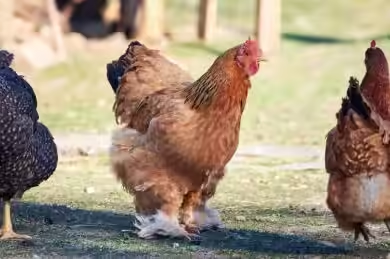Last updated on July 19, 2025
Lost broilers that looked healthy yesterday? I’ve been there. It’s frustrating when your birds don’t grow well. Here’s a secret for your flock: deworming. If you’ve asked, “At what age should broilers be dewormed?” you’re in the right place. This article shows you exactly when and how to deworm broilers. You’ll learn to grow them faster—with fewer deaths.
I’ve seen how good deworming helps a flock thrive. It’s not just treating sick birds. It’s about stopping problems early. This boosts feed use. It also keeps death rates low. For a complete guide, see our broiler chicken farming guide. Let’s start.
Why Deworming Matters in Broiler Farming
Deworming is crucial because internal parasites steal nutrients, leading to slower growth, poor feed efficiency, and higher mortality.


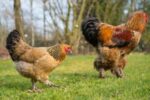
Worms are tiny, invisible thieves in your broiler’s gut. They steal vital nutrients. These are the building blocks broilers need for fast growth.
When worms steal nutrients, your expensive feed isn’t fully used. This means slower weight gain and less profit. Learning how to save money on broiler feed without cutting corners is key when worms steal your investment. It’s a frustrating cycle, but you can stop it.
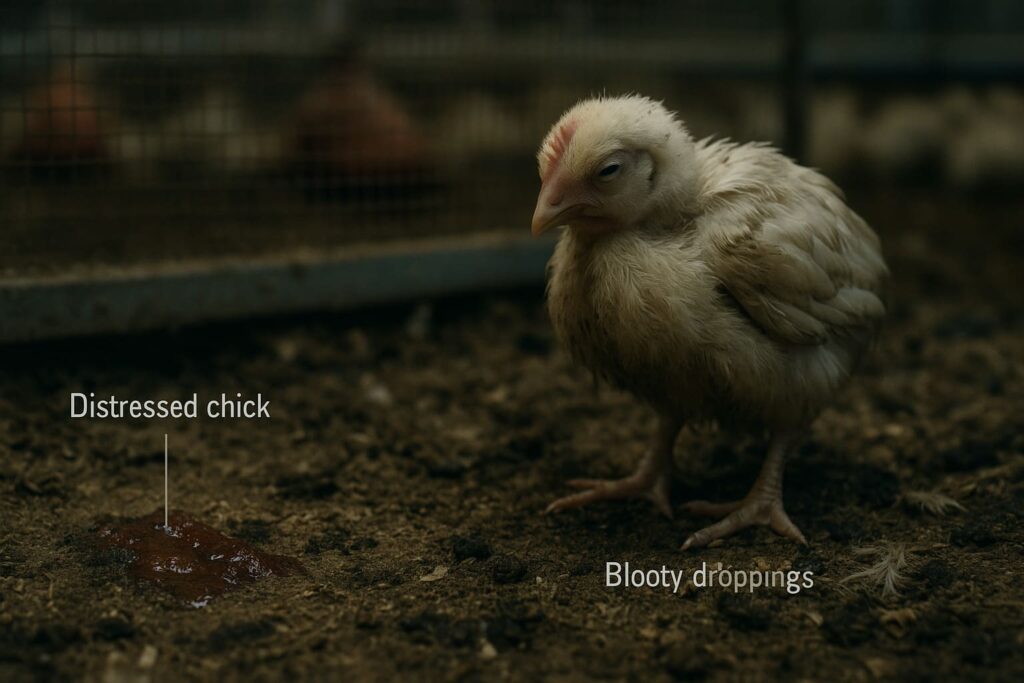
How Worms Affect Broiler Growth and Survival
Worms, or internal parasites, cause trouble. They harm the gut lining. This makes it harder for broilers to absorb nutrients. It leads to slow growth. Their immune systems weaken. They get sick easily.
Many worms can block the gut. This can cause severe blood loss. It can even lead to death. This really hurts your farm’s profits. I once had broilers that wouldn’t gain weight. I fed them a lot, but nothing worked. It was a bad worm problem. That taught me a hard lesson about ignoring deworming. It felt like pouring money into feed for nothing. For more on early chick mortality, see top 10 reasons day-old chicks die early.



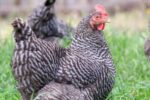
As Dave Cunnah of Janssen Animal Health states, “Worm infections are a costly problem for farmers. The animals grow less and together with the higher feed prices, the losses are getting even bigger. Worms in birds could cause gut damage, leading to poor use of feed…” (Source: Poultry World). This sums up why we can’t ignore them.
The Alabama Cooperative Extension System also highlights this: “A flock that carries a heavy load of parasites will not produce as many eggs, hatch as many chicks, or live as long as a flock with no load or one that is relatively light.” (Source: Alabama Cooperative Extension System).
Common Types of Worms Found in Broilers
Common internal worms in broilers include roundworms, cecal worms, and tapeworms, each impacting the birds’ health and nutrient absorption differently.
Broilers can get several kinds of worms:



- Roundworms (Ascaridia galli): Long, white worms in the small intestine. They compete for food and can cause blockages.
- Cecal Worms (Heterakis gallinarum): Live in ceca. They don’t cause much harm. But they can carry blackhead disease.
- Tapeworms (Cestodes): Flat, segmented worms. They attach to the gut wall and absorb nutrients. Less common, but still a problem.
Knowing these types helps you spot signs. It also helps you pick the right dewormer. I once suspected tapeworms. My birds looked unhealthy, but I saw no roundworms. A lab test confirmed I was right.
At What Age Should Broilers Be Dewormed?
This is the big question. Getting the first deworming time correct is key. It sets your broilers up for success.
Recommended Deworming Age for Broilers
The best time to deworm broilers is around 3 to 4 weeks old. This age is perfect. Their immune systems are still growing. This makes them more likely to get worms. But they’re old enough to handle the medicine.
Deworming them now clears out early worms. This stops worms from hurting their growth. I used to wait until 5 weeks. Big mistake. My broilers looked fine, but growth slowed. I had some sudden deaths. Earlier deworming could have stopped that. That experience taught me to act early. This also ties into what kills broilers at 4 weeks.





Deworming Based on Broiler Growth Stages
Three to four weeks is a good rule. But think about your broilers’ growth. For fast-growing breeds like Cornish Cross, early deworming is vital. Any delay in their first few weeks hurts their final weight. Slower-growing breeds, like Noiler chickens, might have more time. But early deworming is still good.
“Deworm broilers first at 3–4 weeks of age.”
The Merck Veterinary Manual says, “Regular deworming of chickens, especially those that go outside, is important for parasite control. The first treatments are often suggested around 3-4 weeks of age.” This matches what works best on my farm.
Signs Your Broilers Need Deworming
Even with a plan, watch for signs. These tell you if your broilers need deworming:

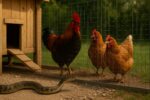



- Eating less food
- Not gaining weight, even with good feeding
- Pale combs and wattles (the red parts on their head)
- Rough or dull feathers
- Diarrhea or strange droppings (sometimes you can see worms)
- Looking tired or droopy
If you see any of these broiler worm symptoms, act fast. Don’t wait, no matter when you last dewormed. I’ve learned to trust my gut. If the birds don’t look “right,” I know something’s up.
Best Deworming Schedule for Fast Growth
One deworming usually isn’t enough. This is true if your broilers go outside. It’s also true if they’re in crowded spaces. A smart broiler deworming schedule is your best defense.
First Deworming: Ideal Age and Dosage
As I said, give the first dose at 3–4 weeks old. Always follow the product label for the right amount. Giving too much can harm your birds. Giving too little can make the medicine not work. It can also cause worms to become resistant.
For many common dewormers like Piperazine, figure out the dose. It’s based on your flock’s total weight and the drug’s strength. I always double-check my math. Getting it wrong can cost you a lot.



How Often Should Broilers Be Dewormed?
For optimal fast growth and low mortality, especially in farms with outdoor systems or high stocking densities, a second dose 7–10 days after the first is often recommended. For continuous prevention in high-exposure systems, deworming every 3 weeks can be ideal. This breaks the worm’s life cycle. It also stops them from coming back. This regular plan has kept my flocks healthy.
Can Deworming Be Skipped in Fast-Growing Broilers?
You might want to skip deworming to avoid stress or waiting times. But it’s a risk that rarely pays off. The small cost of deworming is tiny compared to losing money from slow growth and dead birds. Even the fastest-growing broilers can be badly hurt by worms.
Trust me, I once thought I could skip a deworming. The birds looked robust. But I lost 12% of that stock to sudden decline and increased deaths. Never again! That incident solidified my belief: deworming is a must for broiler farming. This is also a common issue when considering why your Cornish Cross chickens are dying.
Here’s a sample 8-week broiler deworming calendar:



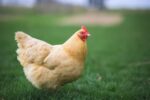
| Week | Action | Notes |
|---|---|---|
| Week 1-2 | Watch them closely | Focus on good brooding, initial health |
| Week 3 | First Deworming | Very important for early worm control |
| Week 4 | Watch them closely | See if they recover and grow well |
| Week 5 | Second Deworming (if needed) | 7-10 days after first, especially if they go outside |
| Week 6-8 | Watch them closely, Final Growth | Make sure they eat well and gain weight |
How to Deworm Broilers the Right Way
Administering dewormers effectively is just as important as choosing the right one.
Oral vs Water-Soluble Dewormers
You have two main options for administering dewormers:
- Water-Soluble Dewormers: Mix these in the birds’ drinking water. Easiest for many birds. All birds get treated at once. Make birds a bit thirsty first. This helps them all drink the medicine. This is my favorite method because it’s efficient.
- Tools: For large flocks, I use a 5-liter medicator connected to the water line, which automatically doses the water. For smaller batches, a simple watering can can work for mixing and distribution. You can find more about essential items in poultry farming equipment for broilers.
- Oral Dewormers: Give these directly to each bird. Use a syringe or dropper. Takes more work. But ensures exact dose for each bird. Good for smaller groups or single birds. I’ve used this for weaker birds needing a guaranteed dose.
- Tools: A 1ml or 2ml oral syringe (without the needle) is perfect for accurate individual dosing.
Natural or Herbal Deworming Options
Yes, you can use herbs to deworm chickens, but they are generally less potent than chemical dewormers and might be better suited for prevention or very light infestations.
Garlic and pawpaw (papaya) seeds are popular. They fight worms. Mix them into feed or water. They can help gut health. They might lower worm numbers. But they’re usually not as strong as chemical dewormers. Don’t rely only on natural methods for commercial broilers. Always talk to a vet first. I’ve tried garlic in the water. It seems to boost overall health. But it’s not a replacement for strong medicine when worms are really there.



Administering Dewormers Safely and Effectively
No matter how you give it, safety and effectiveness are key.
- Read the Label: This is the most important step. Understand the deworming dosage. Know how to give it. And know the withdrawal period. Skipping this step will cause problems.
- Calculate Correctly: For water-soluble products, figure out the right amount of drug. Base it on your flock’s total weight and estimated water consumption. I always use a kitchen scale to be exact when I mix.
- Practical Dosage Example (Always check your product label!): A common Piperazine product might say “1 gram per liter of drinking water for 24 hours.” If you have 100 birds, each weighing about 1.5 kg, they might drink about 30 liters of water a day. So, you’d need 30 grams of the dewormer.
- Ensure Uniformity: If you use water-soluble dewormers, remove all other water during treatment. This makes sure all birds drink the medicated water. This is vital for treating the whole flock. Remember, clean water is more important than feed in poultry farming.
- Avoid Overdosing: Too much medicine can be toxic. It can also leave drug leftovers in the meat. Be careful. Re-read instructions. I learned this the hard way. A small overdose made a few birds tired. Luckily, no serious harm, but it scared me.
- WARNING: Never skip the withdrawal period—it directly affects meat safety. This can also lead to legal trouble.
Choosing the Right Dewormer for Your Flock
Choosing the right dewormer involves selecting products effective against common broiler worms like Piperazine, Levamisole, or Albendazole, while always considering the crucial withdrawal period for meat safety.
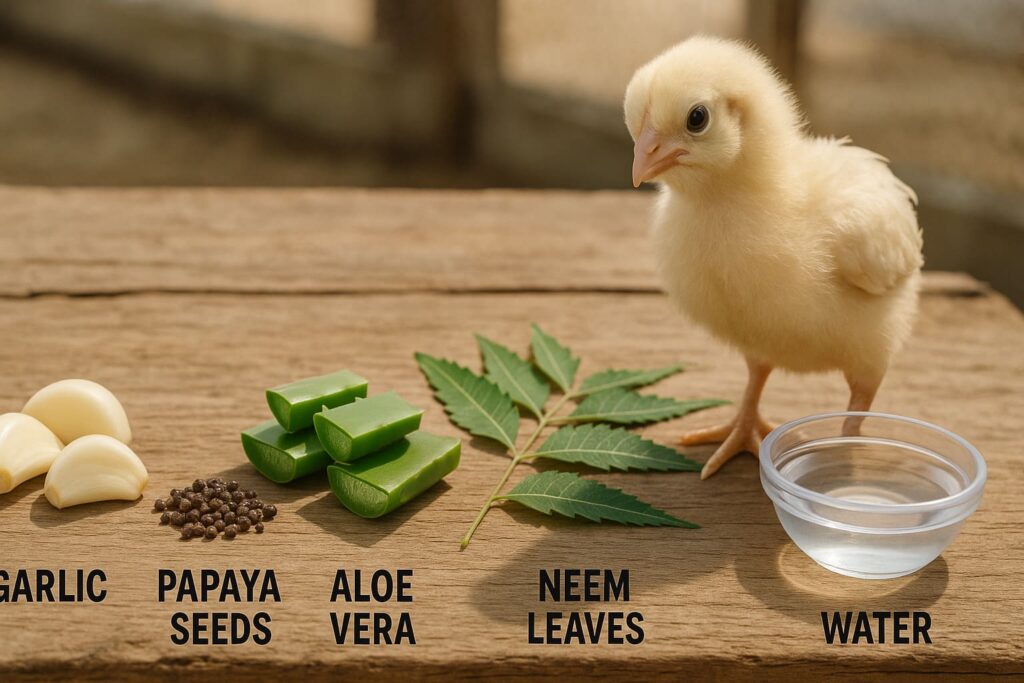
Picking the best dewormer for broilers depends on the type of worms you’re fighting. It also depends on what’s available where you live.
Top Deworming Products for Broilers
Some common and effective dewormers are:
- Piperazine: Works well against large roundworms. Generally safe. Short waiting period. Often my first choice.
- Levamisole: Broad-spectrum. Works against roundworms and cecal worms.
- Albendazole: Broad-spectrum. Works against more worms, including some tapeworms. Often has a longer waiting period.
Always talk to a local vet. They can help you pick the best drug for your farm. They can also help fight drug resistance. Their advice is priceless. It’s based on the worms common in your area. For other essential poultry health products, check out must-have medications for broiler chicks.
Withdrawal Periods: What You Must Know
The withdrawal period is the mandatory time between a dewormer’s last dose and when broilers can be safely processed for consumption, ensuring no drug residues remain in the meat.
This period is a must. It’s between the last dose of medicine and when you can safely process the broiler for eating. It makes sure no drug is left in the meat. This protects people who eat it. If you ignore this, you could face legal problems. You could also create health risks. I always mark my calendar with the withdrawal date. This helps me avoid mistakes. This is a very important safety step you must follow.
Here’s a simplified safety table (always check your specific product label!):
| Dewormer Type | Typical Withdrawal Period |
|---|---|
| Piperazine | 0-2 days |
| Levamisole | 3-7 days |
| Albendazole | 7-14 days |
Disclaimer: These are general guidelines. ALWAYS look at the specific product’s label for exact withdrawal periods.
Antibiotics vs Dewormers: What’s the Difference?
Antibiotics treat bacterial infections, dewormers target internal parasites, and vaccines prevent specific diseases; they are not interchangeable and serve distinct purposes in broiler health.
It’s easy to mix these up. But they do totally different things:
- Antibiotics: Fight bacterial infections. Don’t affect worms.
- Dewormers (Anthelmintics): Fight internal parasites (worms). Don’t affect bacteria.
- Vaccines: Stop specific diseases. They make the bird’s body fight off sickness.
Each has its place in broiler disease prevention. But you can’t swap them. Knowing their different jobs is key for good broiler care. I’ve seen new farmers mistakenly give antibiotics for worm signs. It’s a common error. It wastes time and money.
Signs of Worms in Broilers You Shouldn’t Ignore
Early detection of worms can save your flock. Knowing what to look for is vital.
Physical Symptoms of Worm Infestation
The physical symptoms of worms in broilers include poor weight gain, pale combs and wattles, ruffled or dull feathers, diarrhea, and in severe cases, visible worms in droppings.
Beyond just slow growth, specific body signs can point to a worm problem:
- Pale Combs and Wattles: Means low blood. Blood-sucking worms often cause this.
- Diarrhea: Can be mild or severe. Often smells bad.
- Ruffled or Dull Feathers: Shows poor health. Means they’re not getting enough food.
- Emaciation: Birds look thin and bony, even if eating.
- Visible Worms: If really bad, you might see worms in their poop. Or around their vent. I once saw a long, spaghetti-like worm in the droppings. That was a clear sign of many roundworms.
According to chicken expert Gail Damerow, “Most chickens have worms, yet they don’t exhibit any signs of disease.” (Source: Randy’s Chicken Blog). This highlights why proactive deworming is so important, even if your birds seem fine.
Behavior Changes That Indicate Worms
Worms can cause broilers to become lethargic, droopy, less active, and sometimes show increased thirst due to dehydration.
Worms don’t just change how birds look. They can change how they act:
- Lethargy and Droopiness: Birds are less active. They stand hunched. Or their wings droop.
- Reduced Activity: They don’t forage or play as much. They spend more time huddled.
- Increased Thirst (sometimes): Happens if they’re losing too much water from diarrhea.
Here’s a quick chart of signs vs. what worm it might be:
| Symptom | Suspected Parasite |
|---|---|
| Poor growth, really thin | Roundworms, Tapeworms |
| Pale comb, low blood | Blood-Sucking worms |
| Diarrhea, ruffled feathers | Any internal parasite |
| Blackhead disease | Cecal worms (carrier) |
How to Confirm With a Vet or Lab
The most accurate way to confirm a worm infestation and identify the specific type is a fecal test. Collect fresh poop from several birds. Take it to a vet lab. They check samples for worm eggs. This helps you pick the best treatment. This step is very important. Especially if you have ongoing problems. Or if you want to improve your broiler deworming schedule. I always recommend this if you’re not sure. It takes out the guesswork.
Boosting Growth and Health After Deworming
After deworming, it’s vital to support broiler recovery and growth through enhanced nutrition, probiotics for gut health, and careful management to prevent re-infestation.
Deworming is just one step. To truly boost growth and health after deworming, you need to help your broilers recover.
Nutrition and Feed After Deworming
After deworming, provide high-protein finisher feed or growth boosters to help broilers recover lost nutrients and support rapid muscle development and weight gain.
After deworming, your broilers’ gut needs to heal. They need to catch up on lost food. Switch to a high-protein finisher feed. Or add growth boosters to their diet. This gives them what they need for fast muscle growth and weight gain. I always make sure to have fresh, good-quality feed ready. I give it right after deworming. It’s like giving them a supercharge after cleaning them out. For more on this, check our broiler finisher feed timing guide or learn how to make a homemade broiler booster.
Probiotics and Gut Recovery
Introducing probiotics after deworming helps restore healthy gut bacteria, improving digestion and nutrient absorption, while electrolytes and vitamins support overall recovery.
Worms can mess up the good bacteria in the gut. Giving probiotics after deworming helps fix gut health. It makes digestion better. It also helps them absorb more nutrients. Think of it as replanting the good stuff in their insides. Electrolytes and vitamins help too. Especially B vitamins and Vitamin K. These support recovery from stress. They also help with any blood loss from worms. I’ve found a noticeable difference in how quickly birds bounce back when I use good probiotics.
Mistakes to Avoid After Deworming
- Returning to Infected Litter Too Soon: If your bedding is full of worm eggs, putting birds back there will cause new problems fast. Clean and disinfect coops very well. Or move them to a new pasture if you have one. This is a common trap I fell into early on, leading to recurring problems.
- Ignoring Nutrition: Don’t think deworming alone will fix everything. Without proper nutrition and gut support, they’ll recover slowly.
- Skipping Follow-Up Doses: As I said, one dose might not be enough. Especially for some worms. You need to break the worm’s life cycle.
Expert Tips & Personal Insights From the Field
I’ve been raising broilers for many years. I’ve learned a thing or two the hard way. Here are some insights I wish I knew when I started.
Real-Life Case: How I Handle Deworming in My Flock
On my farm, I stick to a strict broiler deworming schedule. I start at 3 weeks. I use a water-soluble Piperazine product. It’s easy to give to all the birds. I always make sure to hold back water for an hour or two before treatment. This makes sure they’re thirsty. They all drink the medicated water evenly. Then, 7 days later, I give a second dose. This routine has greatly lowered my death rates. It has also made my birds much heavier. It’s now a must-do part of my fast-growing broilers care.
Mistakes I’ve Made – So You Don’t Have To
My biggest mistake, as I said, was thinking I could skip deworming. I thought my birds looked healthy. I was wrong. Hidden worms quietly took away their potential. This led to them not using feed well. And finally, a batch that didn’t reach target weights. I also once gave too little medicine. I messed up the water calculation. This meant the treatment didn’t work. I had to treat them again. That caused more stress. Always double-check your math! These experiences taught me resilience and the importance of meticulous planning.
Seasonal Adjustments to Deworming Schedules
Here in Nigeria, the wet season brings more humidity. It also means more muddy spots. These are perfect places for worms to grow. During these months, I’m extra careful. I might deworm more often. Or I might clean the environment more. In drier times, there might be fewer worms. But I still stick to my main schedule. Other farmers in my community have taught me this. Many experienced poultry keepers here adjust their broiler disease prevention plans based on the season. I’ve picked up some great tips from older farmers, like adding a bit of wood ash to the litter during the dry season to help with moisture control and deter parasites.
Wrapping It Up: Your Path to Healthier Broilers
Alright, we’ve covered a lot! The main thing to remember is that deworming your broilers at the right age—around 3 to 4 weeks old—is key. Follow up with a second dose about 7 to 10 days later. Always read the product label carefully for dosages and withdrawal times. Use the right tools, whether it’s a medicator for water or a syringe for individual birds. And don’t forget to support their recovery with good feed and probiotics.
Deworming isn’t hard. Once you get the timing right and follow these steps, you’ll see better growth and fewer losses. It’s a small effort that makes a huge difference to your farm’s success.
Got your own deworming tips or a story to share? I’d love to hear them! Share in the comments below.
FAQs
What is the best age to deworm broiler chickens?
The best age to deworm broiler chickens for the first time is typically around 3 to 4 weeks old. This helps prevent early infestations from impacting their rapid growth.
How often should I deworm my broilers?
For best results, deworm broilers at 3-4 weeks, then again 7-10 days later. If your birds have outdoor access or high exposure, deworming every 3 weeks can be ideal.
Can natural remedies fully replace chemical dewormers for broilers?
Natural remedies like garlic or pawpaw seeds can help prevent worms or manage light infestations, but they are generally less potent than chemical dewormers for active, heavy worm burdens. Always consult a vet for severe cases.
What are common signs that my broilers have worms?
Common signs include poor weight gain, pale combs, ruffled feathers, diarrhea, and sometimes visible worms in droppings. Changes in behavior like lethargy or reduced activity can also indicate worms.
Is there a waiting period after deworming before I can process my broilers?
Yes, most dewormers have a “withdrawal period” that must be followed. This is the time you must wait between the last dose and processing to ensure no drug residues remain in the meat. Always check the product label for specific times.

